Jr. Handling
A Show Dog's Life
Page 1
A Show Dog's Life
Page 1
At a dog show, a dog must not only conform to the standard, he must have a good temperament, PLUS his handler must present him to the judge properly. In a normal dog show, dogs are judged.
In Junior Handling the children compete, and the dog IS NOT judged, but the child is judged on being able to properly present themselves and their dog to the judge. They must know triangles, T's, L's, down and back, stacking, showing the dog’s bite AND the anatomy of the dog, including what the dog was bred for.
Junior Handling is about HOW to present the dog, how to present yourself, how to address a judge with respect, eye contact And posture. There is a lot to it that the dog owner does not know.
In Junior Handling, you must be able to present your dog to the judge for hands-on examination. While on the table, the judge will want you to show her the dog’s bite. She may quiz you on the breed, what it was bred for, what are disqualifying faults, what group it belongs to, etc. She may ask you to name a couple body parts, like the withers and stifle. She will want your dog (large dogs on the ground) stacked and standing still for a hands-on exam. She will want you to address her with respect, and make eye contact.
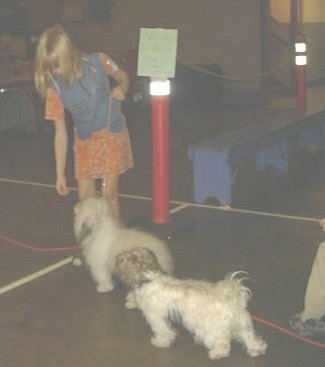
Junior Handler Emily
In Canadian Kennel Club (CKC) Junior Handling there are seven classes:
PeeWee: This class is for handlers 4-6 years of age, as of Dec. 31st of the year preceding. This class is Optional and Non-competitiv.
Junior Novice: This class is for handlers 7 to 10 years of age, as of Dec. 31st of the year preceding who have not won six first places in the same class with competition.
Open: This class is for handlers 7 to 10 years of age as of Dec. 31st of the year preceding who have won six first places in the same class with competition.
Intermediate Novice: This class is for handlers 11 to 14 years of age as of Dec. 31st of the year preceding, who have not won six first places in the same class with competition.
Open: This class is for handlers 11 to 14 years of age as of Dec. 31st of the year preceding who have won six first places in the same class with competition.
Senior Novice: This class is for handlers 15 years of age as of Dec. 31st of the year preceding and up to 18 years old who have not won six first places in the same class with competition.
Open: This class is for handlers 15 years of age as of Dec. 31st of the year preceding and up to 18 years old who have won six first places in the same class with competition.
The first place winner from the six competitive classes competes for Best Overall.
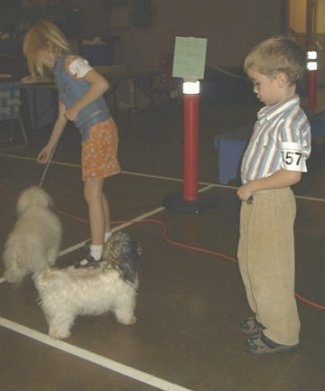
Junior Handlers Kayden and Emily
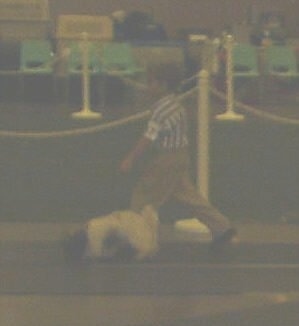
Junior Handler Kayden
How is Junior Handler PERFORMANCE judged? (CKC)
RESPECT & MANNERS Eye contact with the judge, and NEVER EVER put yourself between the judge and your dog. If you are first in line, ask the handler behind you if they are ready to go.
DRESS Your apparel and the entire way you present yourself to the judge are very important. Dress formal and professional. NO high heels... NO low cut tops... NO low cut jeans.... NO Short or tight skirts!!
CONFIDENCE Brings you a LONG way!!! Your “look,” your posture, your eye contact, your“attitude. LOVE what you are doing and let it show. Smile LOTS.
STAY FOCUSED Pay attention to what is going on, remember the first and last dog, and be ready for your turn. Do not chit chat with others, Keep your eye on the judge and your dog at all times. Watch what the judge asks the other handlers to do, as she may ask a sneaky question, like: repeat the pattern the last girl did. If you are not paying attention, you will not know what to do.
Show the Judge what she wants to see.: this could be face, fronts, rear. You need to watch and read the judge, and know what she is looking for at certain times
DOG RELATIONSHIP How you treat your dog is extremely important. Talk to your dog. Never hit your dog. Do not raise your voice. Treat your dog like your best friend. You and your dog should be presented as a team.
KNOWLEDGE of DOGS: You will be asked questions on dog anatomy, Breed- specific questions about the breed you are showing, or other dogs in the ring, dog faults, and dog show questions about groups. In hHigher groups, ANY dog related question is asked.
SPORTSMANSHIP: A judge may place you at the end of the line, making it look like you are last, JUST to judge your sportsmanship, facial expressions and& attitude. —Basically judging your rReaction. Remember the show results are NOT final, until the ribbon is handed out. KEEP SHOWING your best.
PROCEDURES: You will be asked to do different patterns - —Down & Back, Triangle, Reverse Triangle, ‘T’, Down & Back in Ppairs, Self- Stacking, L’s, show the bite or teeth, ground or Table presentation.
PROPER PRESENTATION of YOUR DOG: Every dog has its BREED REQUIREMENT, for grooming, stacking, moving and attitude. You MUST be able to properly present YOUR breed to the judge.
In Senior and Open classes, they may be required to change breeds, and so, they must know how to present a variety of breeds.
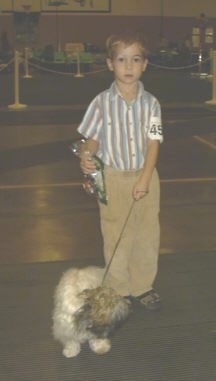
Junior Handler Kayden
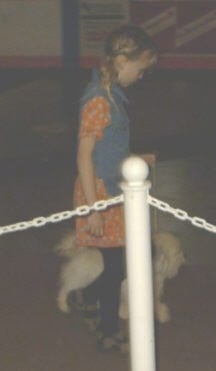
Junior Handler Emily
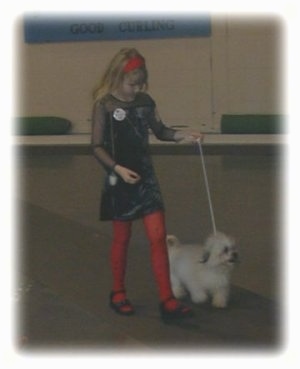
Emily of MistyTrails competed in 2004 and qualified with her wins as #1 Jr. Handler for the Province.
Cole and Zorro, waiting to compete
Junior Handling
PeeWees, ages 4, 5 and 6
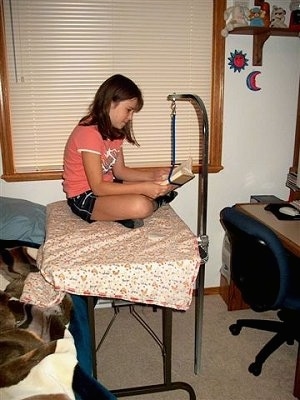
Part of Junior Handling is an oral exam. You must know dog anatomy, you must know your breed. You may get asked what the breed behind you is. You need to know your dog, what group your dog is in, what your dog was bred for, and what are the disqualifying faults on your dog. Studying dogs and your breed is all part of Junior Handling.
Courtesy of MistyTrails Havanese